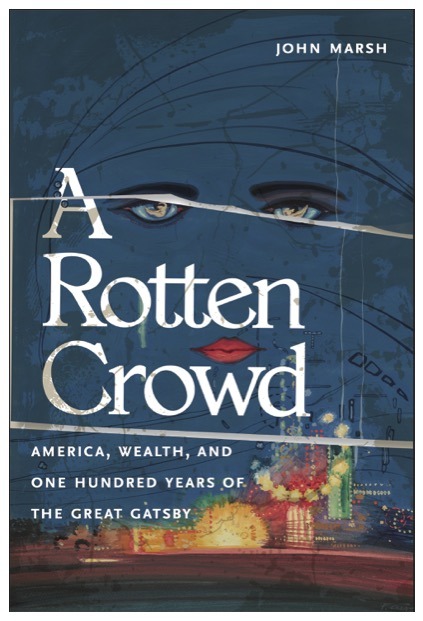This event was held Thursday, September 25, 2025, 7:00 p.m.
Glenview Mansion
603 Edmonston Drive, Rockville, MD 20851
John Marsh
“The Bond Market: The Great Gatsby in the Age of Trump”
One hundred years after its publication, The Great Gatsby remains as relevant as ever. Name the issue—political corruption, economic inequality, the rottenness of the wealthy, the perils of nostalgia, the bogeyman of race and immigration—and Fitzgerald beat us to it. In a time of epidemic loneliness, what can the novel tell us about how the pursuit of wealth can degrade our relationships with others? Both Nick and Gatsby deal in financial bonds. But what kinds of personal bonds can form in a world, then as now, dominated by the creation of wealth?

John Marsh is Professor and Head of English at Penn State University. He is the author of Hog Butchers, Beggars, and Bus Boys: Poverty, Labor, and the Making of Modern American Poetry (2011), which offers a revisionary history of poetic modernism that recovers the decisive role workers and the poor played in the formation of early twentieth-century American poetry; Class Dismissed: Why We Cannot Teach or Learn Our Way out of Inequality (2011), which debunks the popular belief that what causes poverty and economic inequality in the United States is lack of education and, thus, that what will fix these ills is more and better education; In Walt We Trust: How a Queer Socialist Poet Can Save America from Itself (2015), which argues that the poetry of Walt Whitman can help us overcome the various sources of malaise (death, money, sex, political disgust) in the 21st century; The Emotional Life of the Great Depression (2019), which tells the story of the Great Depression through its paradigmatic emotions: despair, anger, sympathy, righteousness, panic, fear, awe, love, and hope; and A Rotten Crowd: America, Wealth, and 100 Years of The Great Gatsby (2024), which takes the 100th anniversary of the publication of The Great Gatsby as an opportunity to inquire into how wealth and a culture of wealth has distorted public and private life in the United States since the turn of the century. A Way with Words: Style in the Age of Artificial Intelligence, is forthcoming in 2025. He is the editor of You Work Tomorrow: An Anthology of American Labor Poetry, 1929-1941 (2007), which collects some of the thousands of remarkable but largely forgotten poems workers and labor organizers published in their union newspapers in the 1930s. The anthology won the 2007-2008 Tillie Olsen Award for Creative Writing from the Working-Class Studies Association. He is also the author of The Puzzle of Poetry (2020), an introduction to poetry textbook that describes how experienced readers go about getting at the meanings in poems. It finds an analogy for reading poems–hence its title–in crossword puzzles. In addition to these books, he has published articles, essays, and reviews in American Literature, American Literary History, College English, Legacy: A Journal of American Women Writers, and more popular venues like The Chronicle Review, Le Monde Diplomatique, Inside Higher Ed, The Hedgehog Review, Salon, and The Utne Reader.

